Roger Thompson wants to be our Rocket Man. He is one of three finalists to be the next president of Missouri State University.
“I studied Missouri State University,” he said. “I sort of believe you've got this really strong foundation on which you've been built. I feel like there's sort of a rocket on the launch pad. I'd like to come join your community to light the fuse on that to see where it can go.”
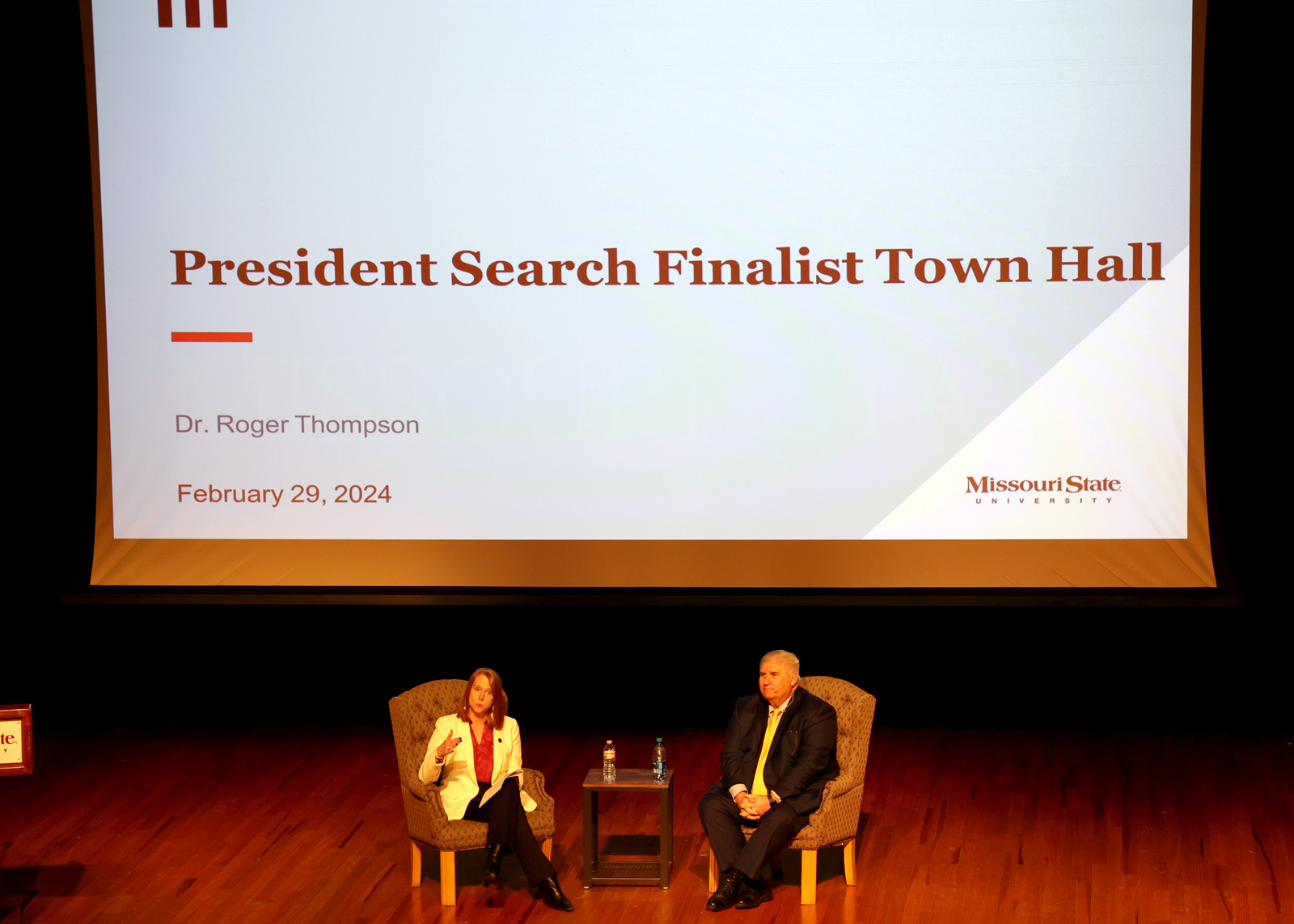
Thompson, 57, has been vice president for student services and enrollment management at the University of Oregon since 2016. He has been at the university since 2010. He has also worked at Indiana University and the University of Alabama.
He was profiled in a Feb. 25 story in the Hauxeda.
He is the third of the three finalists to meet with faculty, staff, students and members of the public at MSU's West Plains and Springfield campuses. He appeared before about 40 people in West Plains on Feb. 28 and about 130 people in the Plaster Student Union theater on the Springfield campus Feb. 29.
This story draws on information from both of those appearances.
The MSU Board of Governors expects to choose a president in early March. The other two finalists are:
- Richard “Biff” Williams, former president of Utah Tech, who completed his visit Feb. 15.
- John Jasinski, provost at Missouri State, who completed his visit Feb. 27.
Major fundraising experience with some of wealthiest donors in Oregon
Thompson has a stellar record in fundraising. Not only is he good at it, he said he likes doing it.
“It's one of the things I really enjoy doing because I find that incredibly inspirational — that people are willing to share in that kind of way,” he said.
Thompson said he was part of a team that was involved in a $100 million scholarship donation from Steve and Connie Ballmer. Steve Ballmer was the CEO of Microsoft from 2000 to 2014.
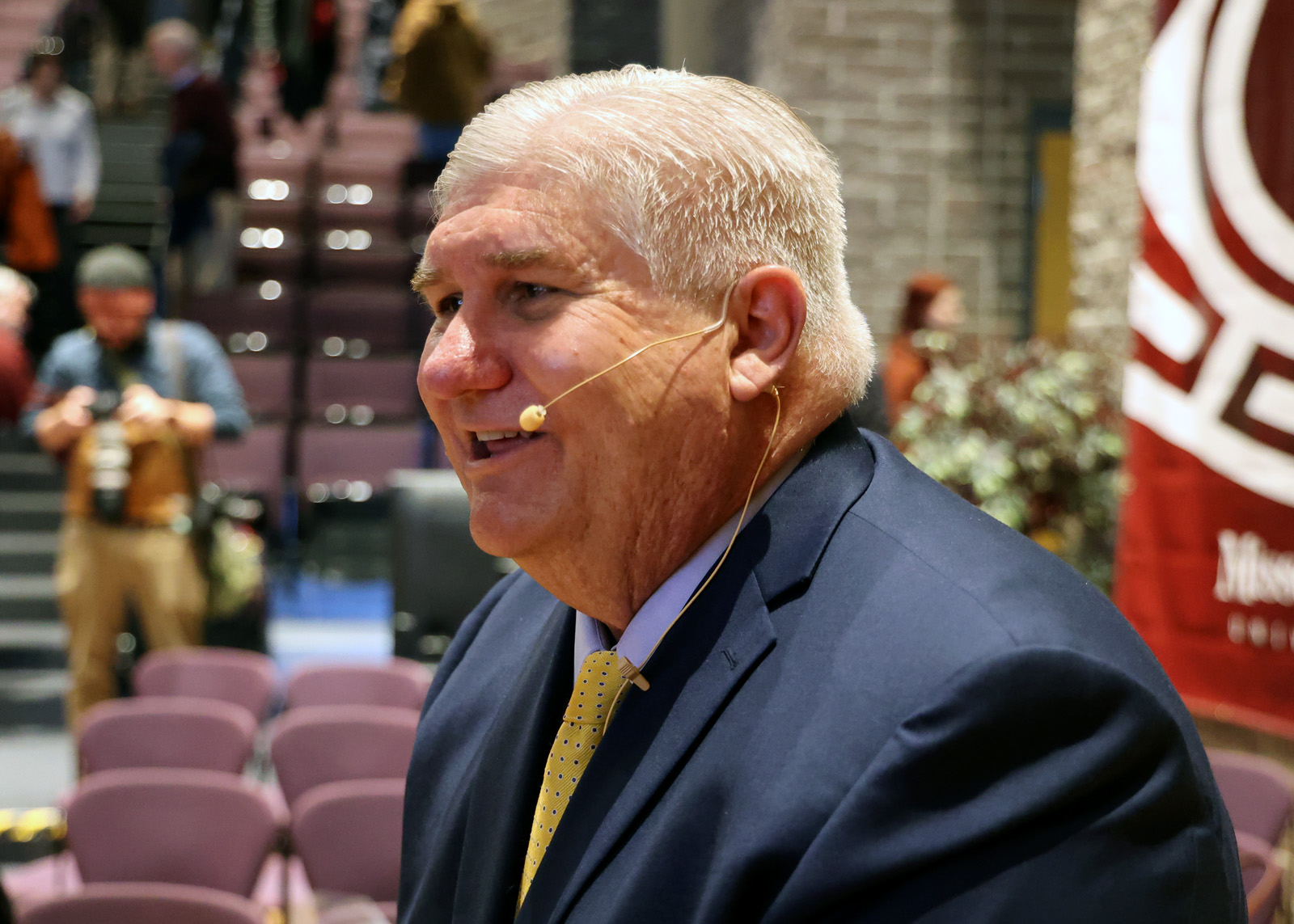
In addition, Thompson knows billionaire Phil Knight, founder and chairman emeritus of Nike. Knight is a University of Oregon grad and a major donor to the University of Oregon.
“First time I met Phil Knight, I was 16 years old,” Thompson said. “My best friend in middle school and high school was his neighbor. In fact, my friend used to babysit the Knight kids when they were little, until he let them get out the trampoline and they shattered a glass backboard.
“I was at my friend's 16th birthday party. It was a surprise party that his mom threw. Phil came over that day. So that was the first time I met him. Incidentally, this is the coolest thing ever. He gave my friend Matt 100 shares of Nike stock for his birthday. This is in the early '80s. And 50 shares of the Boston Celtics.
Thompson was a vice president at the University of Oregon when he met Knight again.
“He said, ‘You can come here and make good decisions and the place will keep rocking along. Or you can come here and do the things to make us great.'
“What most people don't know is he's given us over $1 billion for science and technology. You know what he said when he did? He wanted his alma mater to find the cure for cancer. That's Phil Knight.”
Thompson was asked if he thought there was a way in which Nike and/or Knight might become an MSU donor.
“There's lots of things about Missouri State athletics I like — but I sure don't like that Adidas logo,” Thompson said. “You know, Nike headquarters is about 10 miles from where I grew up, employs thousands of people. You're not going to catch this guy wearing something other than a swoosh.”
Perhaps, Thompson said, when the bid is up for athletic equipment and uniforms at MSU, there might be a way to get Nike to bid.
A tour of MSU campus, a dining-hall meal
Thompson is married with two daughters. His wife is from Kansas City and so is his mother. His father is from St. Louis.
“For those of you from St. Louis, I hope you'll appreciate this story: I always tell my dad that I can think of 1,000 names for a street better than Skinker.”
Skinker Boulevard is in St. Louis.
Thompson received a master’s degree in college student personnel administration from the University of Central Missouriin Warrensburg. He worked there as a graduate student in student affairs from June 1988 to May 1989.
He walked the Springfield campus Tuesday, when it was 80 degrees, and talked to students and went to a dining hall.
One student talked about barriers to graduation, such as the difficulty of completing college in four years. One talked about how affordability was an issue.
“I'm very proud of the fact that we're one of the few schools in the country that has guaranteed tuition and fees,” Thompson said about the University of Oregon. “The amount you pay when you start as a freshman is a same amount that you will pay when you're a senior.
“I believe that's ethical, I believe it's how you should be communicating with students and families,” he said.
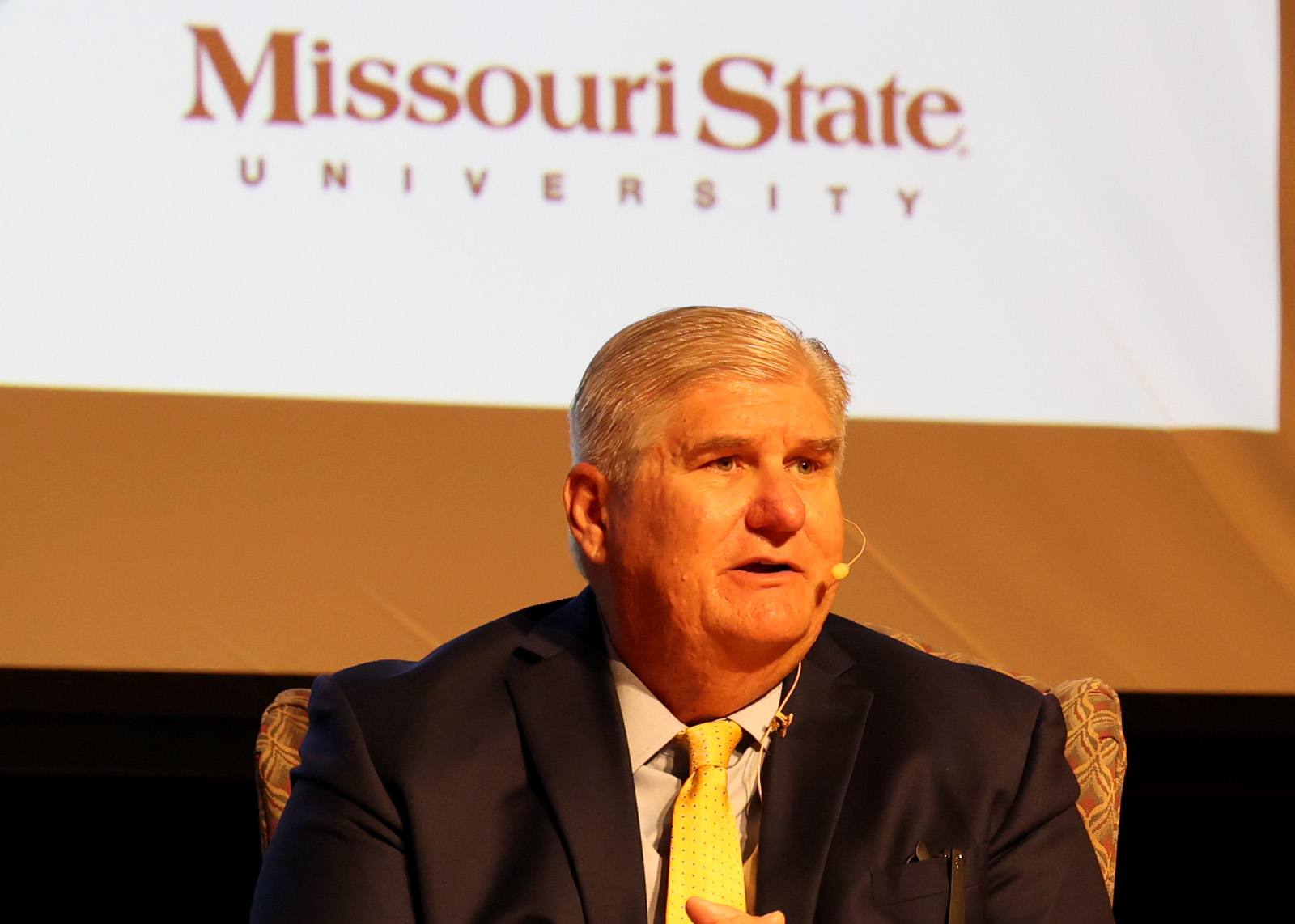
Thompson said he heard many positive comments about MSU on his Tuesday stroll.
Thompson said he chatted with a student in the dining area of Shannon Hall. The student raved about the chicken-fried steak.
“I'm not sure I need more chicken-fried steak to be honest,” he said, patting his waistline. “But he claims that's top shelf.”
Greatest accomplishment? Scholarships for students who need financial help
“Our Pathway Oregon program is something that we created at the University of Oregon. It's for students in the state of Oregon that come from Pell Grant eligible families — in our state that's a family of four with an annual income of about $52,000 or less.
“What we say to those students is, if you work hard, play by the rules, the University of Oregon will pay your tuition and fees in full for all four years. There's no state money in it at all.”
In fact, the University of Oregon relies little on state funding. He said 7 percent of the university's revenues come from state funds.
“We rank 49th out of 50 in state appropriation to higher education. Thank heavens for Colorado. So we're not bringing up the rear.
“I'm sort of operating in this world where we're publicly governed, but privately funded.”
Sports can bring great energy to a school
Thompson referred to intercollegiate athletics as a “front porch” for a college or university.
“If people get to know the University of Oregon through fall Saturdays and Oregon football, well, by golly, it's our job to tell them what happens Monday through Friday.
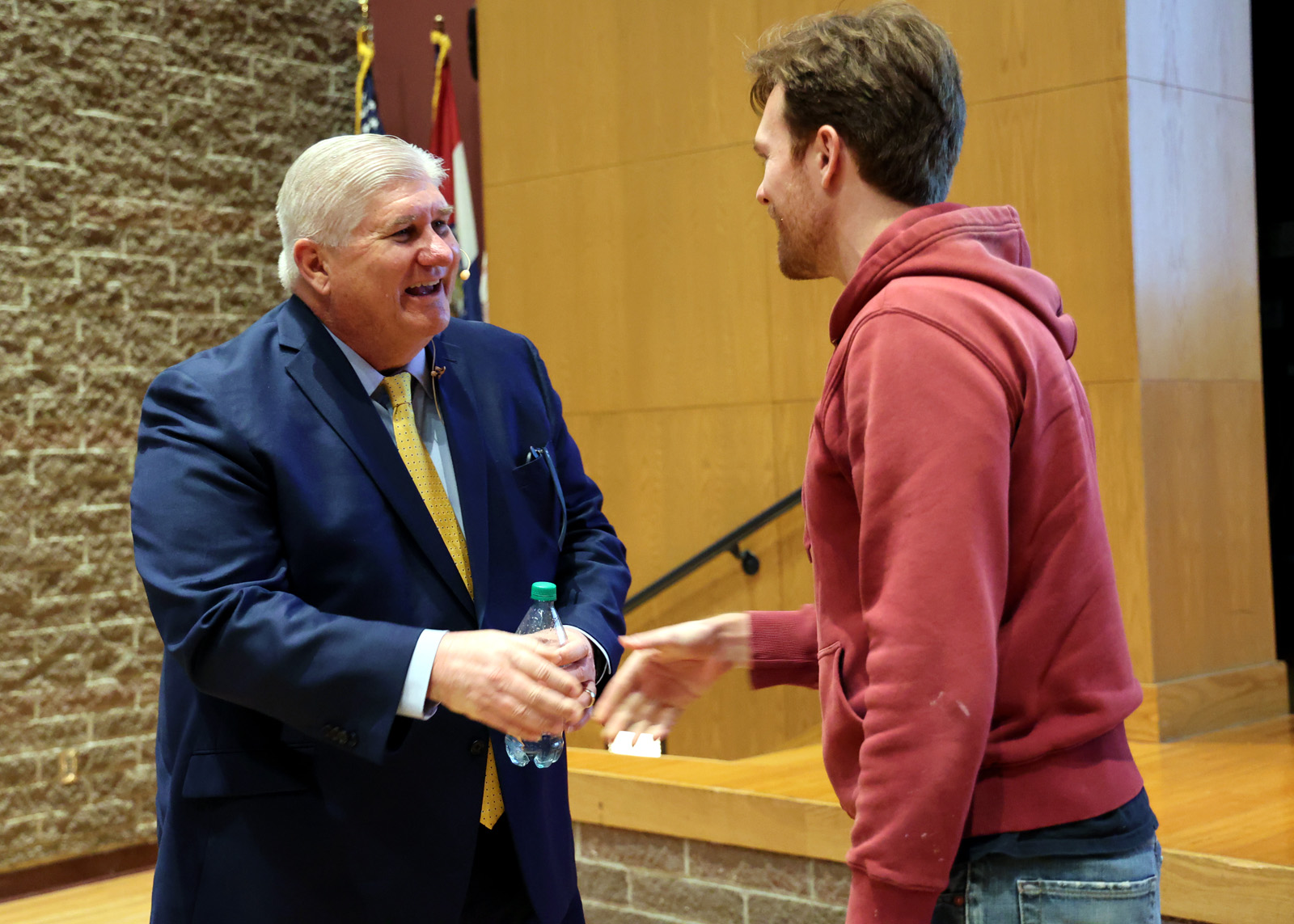
“The first thing is a winning product on the field, the court, whatever, always helps. But secondly, we have to listen to the people that are going to these ball games or also the people not going to these ball games. I feel confident they're doing that currently” at MSU.
“I've seen so many students in my career who walk into an athletic event by themselves, end up in the student section and suddenly they've got a whole bunch of friends.”
Universities need to lean into their strengths, or “gems,” he said.
“I think so many times in higher education we try to be all things to all people. I never think that's quite wise. Find what the gems are, lean in and highlight those things.”
He said he visited the MSU campus in Mountain Grove, where research is done on grapes and making wine.
“That's the coolest thing I've seen in a while and I don't even drink wine,” he said.
“That's a gem. How do we lean into that and talk about it so the people in the state of Missouri appreciate the things that are happening at Missouri State?”
The thing he says most often
Thompson said repeatedly — at West Plains and in Springfield and in various videos in which he has appeared — that the most important thing he tries to impress on anyone who works for him is this:
“I learned long ago in my career that when a student comes to our universities, any of them, the families are entrusting us with the most precious thing in their life. And that's a responsibility that I take very seriously.”
He said he thought that way as a father when his daughters went of to college and he has kept that idea as a priority wherever he has worked.
Biggest failure and what did you learn from it?
An audience member asked Thompson to recall his biggest failure, as well as what he might have learned from it.
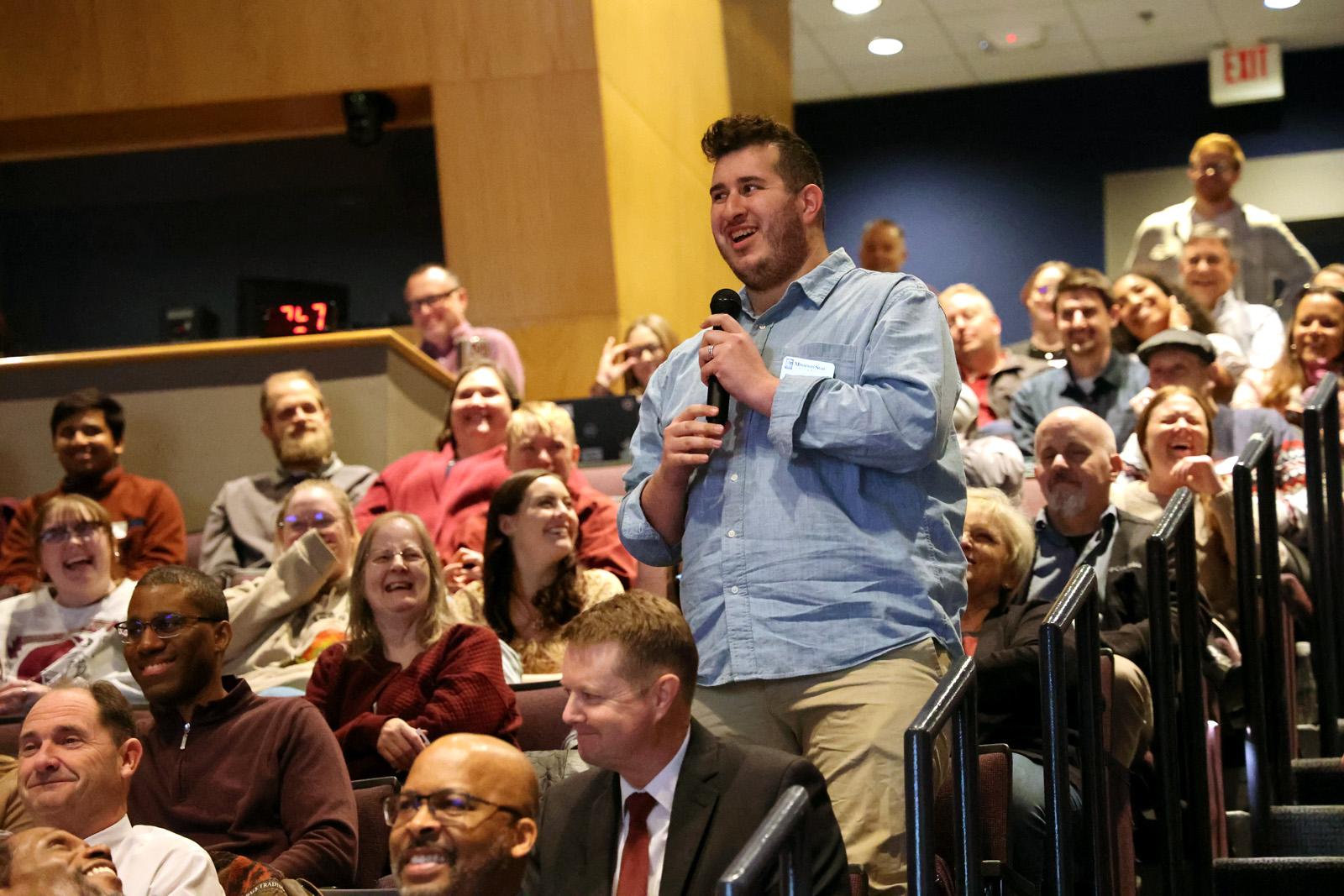
Thompson said his biggest failure was at an institution prior to the University of Oregon.
“It was not taking action soon enough, in an area that desperately needed my leadership,” he said.
“I was reminded during that time, that hope really isn't a strategy,” he said.
Years later, at the University of Oregon, he was given the responsibility of fixing a health care system on campus that was failing students. He quickly brought in experts and fired the director and hired someone new.
“I don't think I would have approached it that way had I not done a fairly miserable job about 15 years earlier in a slightly different situation.”
His three top risks facing higher ed
First, he said, enrollments will drop nationally because of population trends.
“It's more than just birth rates are shrinking,” he said. “It's also that the only demographic that's really growing in our country is Latino, Latina, Hispanic. And the research tells us that that's the least likely group to go to college.”
Another threat is that more people are questioning the value of a college education.
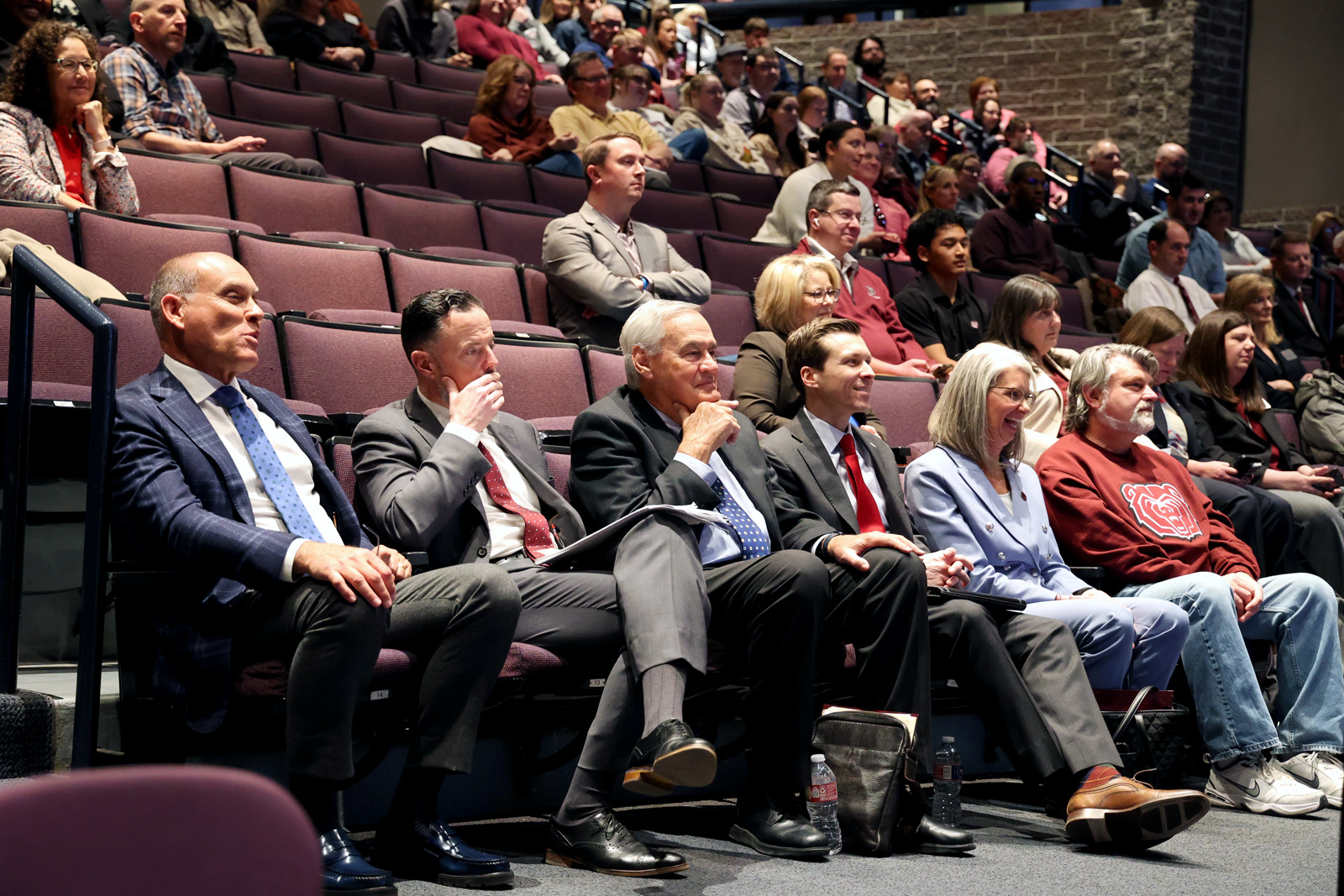
“I've been in higher education a long time. I don't think I've ever seen the value of higher education challenged as much as it is today. I also think it's unfortunate that some of the government officials that are challenging the value of higher education are actually Ivy League-educated themselves.”
The third concern is the diminishing percentage of university budgets funded by state appropriations.
A record of inclusion at Oregon
“When I arrived, if you were going to measure by percentage, the students that come from traditionally underserved under-represented backgrounds, that percentage would have been 17 percent on a base of about 3,700 students (of incoming freshmen).
“Today, that percentage would be 37 percent on a base of about 5,200 students in a freshman class,” Thompson said.
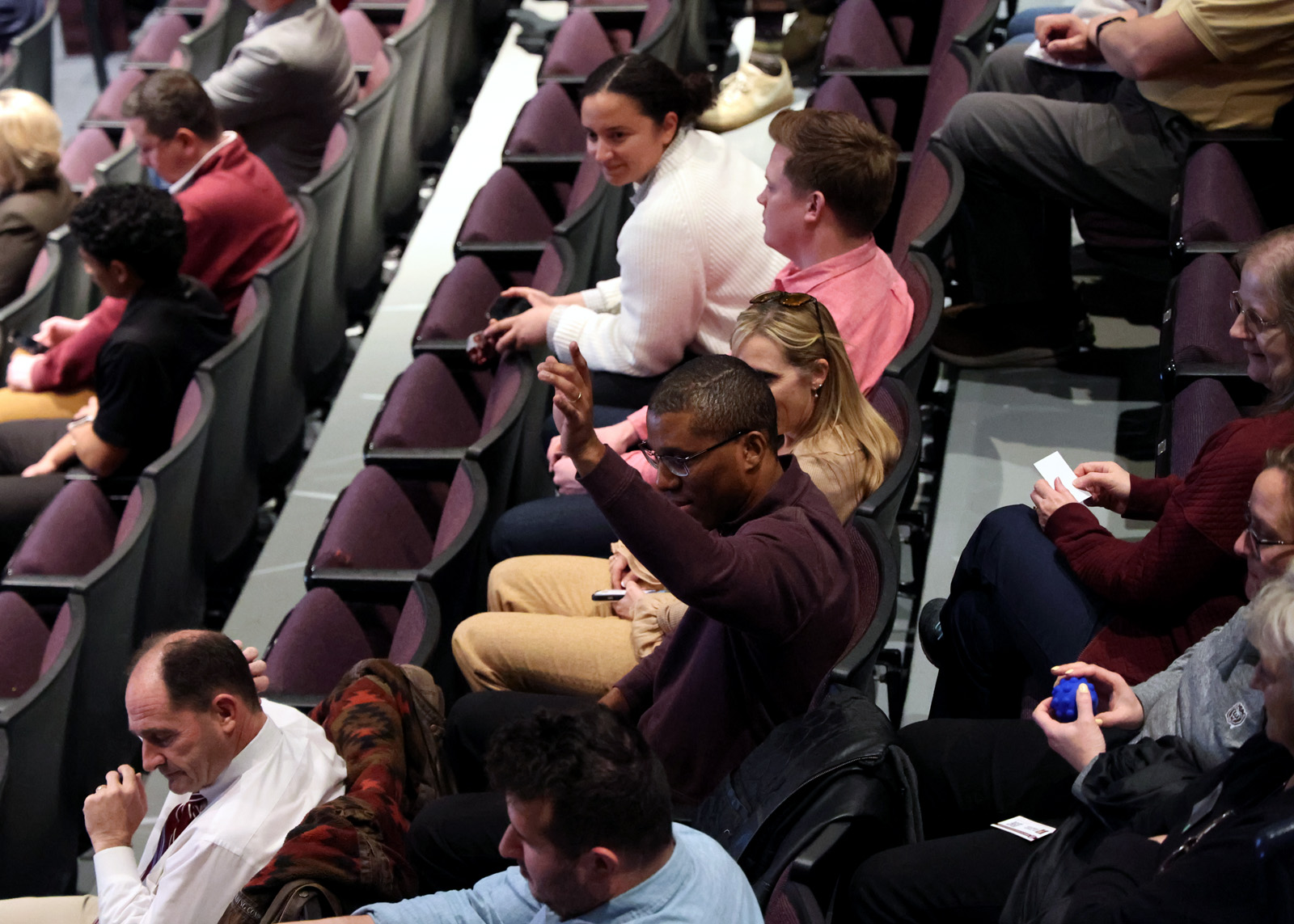
Thompson said he leads a division at the University of Oregon with 1,900 employees and a budget of about $250 million.
“We want to have an inclusive workplace. Sometimes I wonder why that seems to be a bad thing to folks. I want people who work in our organization to feel great and proud about where they work.”
His division started a workplace survey to gauge inclusion and other areas of employment satisfaction.
“You can't solve problems if you don't know what they are,” he said.
Will you continue to try to raise salaries?
Thompson said he didn't have enough information to guarantee anything regarding salaries.
“I don't have enough information to tell you how to solve that, and quite frankly, if I did suggest how to solve it, you should be very skeptical. I got off a plane a couple of days ago.
“But I can tell you that I've spent my career being in the job preservation business, not the job elimination business.”
Finally, he was asked what faculty, staff and students can do to help a university president do his or her job.
“I just think we all need to give each other a lot more grace,” he said.

